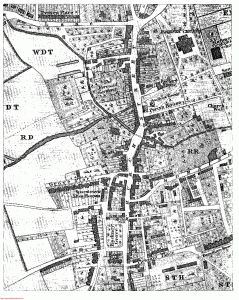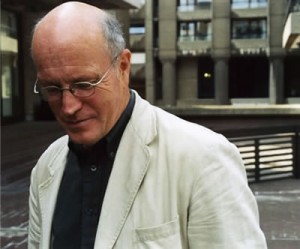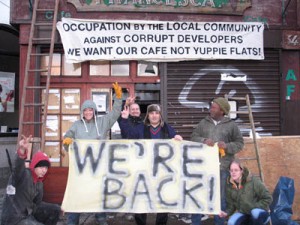
Nineteen years ago, on moving to London with a thinner waist and a head full of functioning grey matter, my father dropped me off in Hackney. Although my older brother had been living all over London for a few years, he’d never stepped foot in the borough. Here was entirely unmapped terrain. Forced by academic circumstance and lack of finance into a student house share, I found myself stood staring blankly at the outside of a five-bedroom house just off Lower Clapton Road. Coming from a hamlet in South Wales that sat a mile and a half from the nearest bus stop, the culture shock was overwhelming. Here in E8, the houses rose up from the ground in a different way and the pubs locked you in after hours. Buses didn’t stop running at eleven (a trick used back home in Wales to make sure the dregs of every-last-orders-called-in-town didn’t turn the No 30 into a travelator of vomit). The streets chimed to languages and frequencies that I’d never heard before – they sounded nothing like English or even Welsh. To me, Hackney was just like that first nervous tug on a passed around cigarette. I tried to get my head round it, but in reality, it just made me feel uncomfortable and more than a little nauseous. The up side was that I met my best friend in that hovel and we made it our avowed intention to get as far away from Hackney as soon as we possibly could. It was that way for the best part of the next two decades.
A couple of years ago I moved back east. I hadn’t so much outgrown the mouse infested dump I lived in on Harrow Road as it had started constricting around me, cutting off my breathing, forcing me awake in cold sweats at night petrified at what brown envelope would arrive on the doorstep that next day. I’d fallen in love and my partner lived just off London Fields. My previous Hackney sojourn had receded into the distant corners of memory. I felt up to the challenge again. Nowadays there was a farmer’s market, there were gastro-pubs. There’s coffee culture, free Wi-Fi, Sustrans cycle tracks. They were connecting Hackney up to a tube line, forcing it kicking and screaming into the 21st century.
All these radical changes had come about – perhaps by accident rather than design – through local council initiatives. Told to pull their socks up by the New Labour government in order to save their skins from bankruptcy, they went into a reformist overdrive. The result saw huge tracts of land being sold to offshore developers. CCTV cameras now stalk every street corner. Screaming police cars soundtrack the through routes from the sundown showtime ‘til sunrise, when the curtains are drawn on all nefarious activities for a few peaceful hours. Hackney has seen a concerted clean up effort as the council have plumped the borough’s filthy cushions in readiness for the 2012 Olympic Games. It was barely the same place that I’d left behind years back but to walk down the streets, did anyone really know or care?

Iain Sinclair – born in Cardiff, another displaced Taff – moved to Hackney 40 years ago. An accidental visit to a friend’s house turned out to be a life-defining moment, a siren’s call from a down-at-heel London borough. He moved in to the area, stayed put and allowed the place to irrevocably shape him and his writing. A series of fiction works were self-published while he toiled in menial, manual jobs – gardening, painting lines on the football pitches at Hackney Marshes. By his own admission, his Trinity College education made him unemployable.
My first exposure to Sinclair was “Lights Out For The Territory”. For me, it is one of those game-changing books. As radical a vision of how to view ‘the city’ as Roger Deakin’s “Waterlog” was for ‘the countryside’. Here was prose that almost read like it had been fused together, like the knotted roots of a tree or the burnt out wires of an imploded electrical appliance. Here was a series of essays about London as viewed by a resident tourist, someone with a magpie eye trained on the impurities of the city’s history. In “Lights Out…” the now threadbare concept of “psychogeography” still seems beautifully inspirational – the idea of walking and exploring this seething city is still both radical and inviting. His non-fiction follow up, “London Orbital”, charts a walk around the 127 miles of M25, the kind of reckless act of physical abandon that inspires heart palpitations just thinking about it.
Now, in 2009, Sinclair has turned his attention to his immediate surroundings – my chosen stomping ground. “Hackney, That Rose-Red Empire (A Confidential Report)” is a detective story. It traces fragments of lives that have moved, almost ghost like, through the borough and pieces them into an alternative history of the area. Here, people are rumours, buildings become characters and the Doomsday Clock that’s counting down to midnight is the Olympics – the blue ring fence marching onwards, restricting the oxygen supply, irrevocably reshaping the landscape in preparation for a two week party sometime in the next decade. Stories in the book are picked over like forensic evidence, names drift in and out, people are half-glimpsed through the fog of memory – Baader Meinhof’s Astrid Proll; Joseph Conrad convalescing whilst writing “Heart Of Darkness” at the end of Graham Road; the Angry Brigade; Tony & Cherie; Jayne Mansfield judging a budgerigar show; Orson Welles standing outside the Empire making a film about alms houses. Think of it as CSI: Mare Street.
Part literary guidebook, part autobiography; part love-letter, part bitter kiss-off, “Hackney…” paints a fascinating, often sobering picture of the area. Every page pulses with memory. Mutterings in pubs take on the long dark shadows of factual inevitability. This is a document of a place where history is being written daily by sifting through tomorrow’s recycling and patchworking together the story of a bizarre and now-compromised district of North London (Hackney has only recently been displaced to the ‘East End’ in the 19th century, losing its NE postcode and part of its identity in the process).
Although Sinclair’s dim view of the changes that the area has been through may sometimes seem curmudgeonly, you have to remember that this is someone who stayed put, who observed from the frontline as the borough alternately went bust and then became the most desirable postcode in the capital (this latter idea may sound ludicrous now but, believe me, it wasn’t when I bought a flat here eighteen months ago). Now full of those magnets for the socially mobile – bistros, delis and late night bars – Hackney is a very different beast from when I moved there first. It must be almost unrecognizable to someone like Sinclair who has put in four decades hard labour pounding its streets. The book becomes a lesson in the causes and effects of gentrification. You don’t get one thing without compromising the other. To hear Sinclair talk it, the clean up operation, the degreasing of the streets and the chemical peel on the brickwork has left a gaping hole – a cultural void. And, really, what will be left when the Olympics pack up and the weeds start to break through the surfaces of the unused sports halls? A tube terminus at Dalston with a few scattered restaurants and some ‘loft style apartments’. All this restyling looks to the dedicated Hackney observer like lipstick on a pig when you’re faced with the sights and smells of somewhere as blissfully unreconstructed as Ridley Road market, all chock full of butchers charging worryingly rock-bottom prices for buckets full of raw Halal meat.

The book – all 570 odd pages of it – is exhaustive; one man’s determined personal road trip measured out in throbbing toes and worn shoe leather. The whole thing serves to paint my chosen burgh (the one that dragged me back just when I thought I was out) as utterly corrupt yet perpetually inventive – a landlocked artist colony destined to be presided over forever by clueless bureaucrats.
Personally, I can’t imagine wanting to read another book so meticulously in depth about a subsection of city, anywhere in the world – mainly because I can’t imagine Iain Sinclair would ever deign to do so anywhere else with such vigour, such anger and such soul. It’s simple – “Hackney, That Rose-Red Empire” really is a life’s work.
Robin
Click here to read an interview with Iain Sinclair from this week’s Observer and here to read the piece that got Sinclair banned from talking in all public buildings in Hackney.